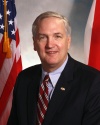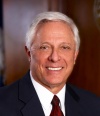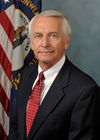State executive responses to Obergefell v. Hodges
By Audrey Ann Faber and Maresa Strano
Follow @ballotpedia
On June 26, 2015, the United States Supreme Court held in a 5-4 decision that same-sex marriage is protected under the Due Process and Equal Protection Clauses of the Fourteenth Amendment. Consequently, same-sex marriage bans have been struck down as unconstitutional, and same-sex marriages performed out of state must be recognized in other states.[1] Justice Anthony Kennedy authored the opinion and Justices Ruth Ginsburg, Stephen Breyer, Sonia Sotomayor and Elena Kagan joined.
Chief Justice John Roberts and Justices Antonin Scalia, Clarence Thomas and Samuel Alito each authored a dissent.
This historic case, Obergefell v. Hodges, consolidated four same-sex marriage cases from Ohio, Tennessee, Michigan and Kentucky, and picked up where the 2013 case United States v. Windsor left off. In Windsor, the court ruled that part of HR 3396 - Defense of Marriage Act (DOMA) was unconstitutional but did not address the constitutionality of same-sex marriage.
Prior restrictions on same-sex marriage
Prior to the June 26 ruling, 15 states had or attempted to institute bans on same-sex marriage. In the seven states denoted in yellow, each state's ban was ruled unconstitutional by either a state or federal court. However, in all seven states, enforcement of these rulings was stayed pending a decision by a higher court. The seven states denoted in red are states where a ban on same-sex marriage was in place and fully enforced. In the single state denoted in purple, the status of same-sex marriage was legally unclear; some counties in Kansas were issuing licenses to same-sex couples, but state officials enforced a ban across the state.
Yellow Ban on same-sex marriage ruled unconstitutional, but enforcement stayed until Supreme Court ruling: Alabama, Arkansas, Mississippi, Missouri[2], Nebraska, South Dakota and Texas
Red Ban on same-sex marriage in place: Georgia, Kentucky, Louisiana, Michigan, North Dakota, Ohio and Tennessee
Purple Complicated legal status: Kansas
For up-to-date information on which counties in the above 15 states are issuing licenses to same-sex couples, please see Ballotpedia's coverage of local government responses to Obergefell v. Hodges.
Responses by state executive officials
The responses to the ruling of the Supreme Court from attorneys general and governors from these 14 states have varied from acceptance of the ruling in states like Georgia and Kentucky, to calling the ruling unlawful in Texas and a call for the disbandment of the Supreme Court in Louisiana. The following is a collection of notable responses from state executive officials across the country in states that had previously outlawed same-sex marriage. The page will be updated as additional responses become available.
For information on state legislative responses to the Obergefell v. Hodges rule, please see Ballotpedia's coverage of state legislative responses to Obergefell v. Hodges.
Alabama
Alabama Governor Robert Bentley (R) released a public statement following the ruling that said his belief in the biblical definition of marriage being between one and woman was not altered by the Supreme Court's decision.[3] Despite his disagreement with the decision, he said would follow the law.[4] Similarly, Republican Attorney General Luther Strange's statement said he disagreed with the ruling, but said Alabama would not violate the law. He closed his statement saying he thought the focus would shift towards protecting religious liberties.[3]
Despite statements from both the state's governor and attorney general, Alabama hasn't yet begun officially issuing same-sex marriage licenses.[5] One of the most outspoken critics of same-sex marriage in Alabama is the state's Supreme Court chief justice, Roy Moore. Moore has been a key player in the state's refusal to issue licenses to same-sex couples, and in February ordered lower courts in the state to disregard a Federal Court ruling that overturned the state's ban on same-sex marriage. Following the announcement of the Supreme Court's ruling on June 26, 2015, Moore called the ruling worse than the Supreme Court ruling that upheld racial segregation.[4] On Monday, June 29, 2015, the Alabama Supreme Court issued a writ of mandamus, which suspended the issuance of same-sex marriage licenses in the state for 25 days to give "parties" the ability to submit briefs on the effect of the Obergefell v. Hodges ruling in the state of Alabama.[6] However, Moore later clarified the order was meant only to prevent probate judges from being forced to issue the licenses for 25 days, and not that it was outlawed.[7]
| “ | I have always believed in the Biblical definition of marriage as being between one man and one woman. That definition has been deeply rooted in our society for thousands of years. Regardless of today’s ruling by the Supreme Court, I still believe in a one man and one woman definition of marriage. The people of Alabama also voted to define marriage as between a man and woman. I always respect the people’s vote, and I am disappointed that the Supreme Court has disregarded the choice made by the people of Alabama in its decision today.[8] | ” |
| —Alabama Governor Robert Bentley (R)[3] | ||
| “ | Chief Justice Roberts agreed with our amicus brief that ‘a State’s decision to maintain the meaning of marriage that has persisted in every culture throughout human history can hardly be called irrational.
While I do not agree with the opinion of the majority of the justices in their decision, I acknowledge that the U.S. Supreme Court’s ruling is now the law of the land. Short of the passage of a Constitutional Amendment protecting marriage as between one man and one woman, the U.S. Supreme Court has the final say. But while the states are now required to recognize same-sex marriage, I expect the focus will now turn to the exercise of one’s religious liberty. I will continue to defend the religious liberties of Alabamians and ensure that people and businesses honoring their religious beliefs are protected.[8] |
” |
| —Attorney General Luther Strange (R)[3] | ||
Alabama Attorney General Strange’s Statement In Response to U.S. Supreme Court Decision On Same-Sex Marriage
Read the Alabama Supreme Court's writ of mandamus:
In the Supreme Court of Alabama: Corrected Order
Arkansas
Following the ruling, Arkansas Governor Asa Hutchinson (R) said that while he does not agree or approve of the ruling, the State of Arkansas will adhere to the decision granting same-sex couples the right to marry, and that Arkansas will recognize same-sex marriages licensed in other states.[9] However, Hutchinson also noted that individuals should be left to choose whether to follow the convictions of their conscience, which led at least one local news outlet to question if that would allow an employer to refuse to hire someone married to a same-sex partner.[10]
Attorney General Leslie Rutledge (R) echoed Asa, saying that while the decision was not representative of Arkansas voters’ views, the decision must be respected and would be considered the law in Arkansas going forward.
| “ | Today the Supreme Court in a 5-4 decision requires the State of Arkansas to recognize same-sex marriage.This decision goes against the expressed view of Arkansans and my personal beliefs and convictions. While my personal convictions will not change, as Governor I recognize the responsibility of the state to follow the direction of the U.S. Supreme Court. As a result of this ruling, I will direct all state agencies to comply with the decision.
It is also important to note that the Supreme Court decision is directed at the states to allow and recognize marriage between two people of the same sex. It is not a directive for churches or pastors to recognize same-sex marriage. The decision for churches, pastors and individuals is a choice that should be left to the convictions of conscience.[8] |
” |
| —Arkansas Governor Asa Hutchinson (R)[11] | ||
| “ | Although this decision does not reflect the will of Arkansas voters, we are a nation of laws, and the judicial system has an important role to play. I am disappointed that the justices have chosen to ignore the role of the States to define marriage. The justices have issued a decision, and that decision must be followed.
We are continuing to review this landmark decision to make sure the full implications are understood and that implementation is consistent with the rule of law. I urge those seeking to marry to be respectful as the State seeks to follow this ruling. Moving forward, it is critically important that the rights of religious freedom be protected, and I am committed to doing so.[8] |
” |
| —Arkansas Attorney General Leslie Rutledge (R)[11] | ||
Memorandum: Rutledge Issues Guidance Following the Supreme Court’s Decision in Obergefell v. Hodges
Rutledge Comments on U.S. Supreme Court Obergefell v. Hodges DecisionGeorgia
Georgia Attorney General Sam Olens (R) was not pleased with the ruling overturning the state's ban on same-sex marriage. Olens had petitioned the U.S. Supreme Court to allow Georgia's voter-approved ban on same-sex marriage to stand, but following the denial of his petition, Olens released a statement that Georgia would not defy the ruling. Georgia Governor Nathan Deal (R) similarly confirmed that while he disagreed with the decision, he and the state of Georgia would follow the law.[12]
| “ | While I believe that this issue should be decided by the states and by legislatures, not the federal judiciary, I also believe in the rule of law...The state of Georgia is subject to the laws of the United States, and we will follow them.[8] | ” |
| —Georgia Governor Nathan Deal (R)[13] | ||
| “ | In our system of government, the Supreme Court bears the ultimate responsibility for determining the constitutionality of our laws. Once the Supreme Court has ruled, its Order is the law of the land. As such, Georgia will follow the law and adhere to the ruling of the Court.[8] | ” |
| —Georgia Attorney General Sam Olens (R)[13][14] | ||
Memorandum: RE: IMPACT OF SUPREME COURT’S RULING IN OBERGEFELL V. HODGES ON GEORGIA'S PRACTICES AND POLICIES RELATED TO MARRIAGE
Louisiana
- See also: Bobby Jindal presidential campaign, 2016
Louisiana Governor Bobby Jindal's (R) initial reaction to the same-sex marriage ruling was to call for the disbanding of the Supreme Court, accusing it of being "a public opinion poll instead of a judicial body" and suggesting that getting rid of the court would save the country some money.[15] Days before the Supreme Court issued its ruling on the landmark marriage-equality case, Jindal formally announced his bid for the 2016 GOP presidential nomination. Accordingly, his repudiation of the justices' decision on Obergefell v. Hodges emphasized its broader, long-term consequences for the country rather than its immediate significance for Louisiana. "Hillary Clinton and the Left will now mount an all-out assault on religious freedom guaranteed in the first amendment," Jindal, who is Catholic, warned. Jindal's Christian faith and values are already a central focus of his presidential campaign. On June 26, the day of the ruling, Louisiana was the only U.S. state that continued denying marriage licenses to same-sex couples; the Jindal administration said it did not have to enforce the ruling until formally ordered to do so by the 5th Circuit Court of Appeals. Despite fervently criticizing the marriage law and being the sole governor to delay implementation, the two-term, outgoing Republican governor made it clear he would not resist the Supreme Court's ruling.[15][16]
Jindal's sentiments were echoed by Louisiana Attorney General Buddy Caldwell (R), who is seeking re-election as the state's chief law officer this fall.[17]
| “ |
The Supreme Court decision today conveniently and not surprisingly follows public opinion polls, and tramples on states' rights that were once protected by the 10th Amendment of the Constitution. Marriage between a man and a woman was established by God, and no earthly court can alter that. This decision will pave the way for an all out assault against the religious freedom rights of Christians who disagree with this decision. This ruling must not be used as pretext by Washington to erode our right to religious liberty.[8] |
” |
| —Louisiana Governor Bobby Jindal (R)[18] | ||
| “ |
This Supreme Court decision overturns the will of the people of Louisiana, and it takes away a right that should have been left to the states. Louisiana voters decided overwhelmingly to place in our constitution an amendment that defines marriage as between one man and one woman. I fought to uphold Louisiana’s definition of traditional marriage, and I was the first attorney general in the nation to be successful at the federal court level. I am extremely disappointed by this decision. It fails to respect traditional marriage as defined by Louisiana voters, and is yet another example of the federal government intrusion into what should be a state issue[8] |
” |
| —Louisiana Attorney General Buddy Caldwell (R)[19] | ||
Statement by Attorney General Caldwell on Today's Supreme Court Ruling
Kentucky
Democratic Kentucky Governor Steve Beshear's defense of the same-sex marriage ban in his state earned him national attention, especially following his hiring of outside attorneys to defend the ban after sparring with Kentucky Attorney General Jack Conway (D) on the matter. However, the governor's response to the Supreme Court ruling was that of acceptance. Following the decision, he issued a letter to all 120 county clerks in the state informing them that a new gender neutral marriage license application, and instructions for how to use it, would be mailed to each county.
| “ | The fractured laws across the country concerning same-sex marriage had created an unsustainable and unbalanced legal environment, wherein citizens were treated differently depending on the state in which they resided. That situation was unfair, no matter which side of the debate you may support.
Kentuckians, and indeed all Americans, deserved a final determination of what the law in this country would be, and that is the reason we pursued an appeal to the U.S. Supreme Court. Today’s opinion finally provides that clarity. All Cabinets of the executive branch have been directed to immediately alter any policies necessary to implement the decision from the Supreme Court. Effective today, Kentucky will recognize as valid all same-sex marriages performed in other states and in Kentucky. I have instructed the Kentucky Department of Libraries and Archives to provide revised marriage license forms to our county clerks for immediate use, beginning today. We will report additional expected policy changes in the coming days[8] |
” |
| —Kentucky Governor Steve Beshear (D)[20] | ||
| “ | Today, the United States Supreme Court issued the final word on this issue. The ruling does not tell a minister or congregation what they must do, but it does make clear that the government cannot pick and choose when it comes to issuing marriage licenses and the benefits they confer. It is time to move forward because the good-paying jobs are going to states that are inclusive.
As Attorney General of the Commonwealth of Kentucky, I did my duty and defended Kentucky's constitutional amendment. When Judge Heyburn ruled the amendment was unconstitutional, I agreed with his legal analysis and used the discretion given to me by statute to inform Gov. Beshear and the citizens of the Commonwealth that I would not waste the scarce resources of this office pursuing a costly appeal that would not be successful. As the Court profoundly stated in its opinion regarding the plaintiffs, 'They ask for equal dignity in the eyes of the law. The Constitution grants them that right.'[8] |
” |
| —Kentucky Attorney General Jack Conway (D)[21] | ||
Attorney General Conway's Statement Regarding Today's Supreme Court Decision
Kansas
In 2014, Kansas voted to pass a constitutional amendment defining marriage as between one man and one woman.[22] However, after a series of court decisions, the ban was overturned. Still, state officials refused to change their policies while Kansas appealed the federal ruling that overturned the ban.[23] Following the ruling by the U.S. Supreme Court, Kansas Governor Sam Brownback (R) expressed his disapproval of decision, stating it was the ruling of an activist court that ignored the wishes of Kansas voters. Kansas Secretary of State Kris Kobach went further, calling the decision "one of the most poorly-reasoned and damaging opinions of our lifetimes," and saying that the Supreme Court justices invented a new right to re-write the U.S. Constitution to reshape the United States according to the views of liberal justices.[22] Despite the disapproval voiced by Kobach and Brownback, all 105 counties in Kansas were issuing same-sex marriage licenses as of July 1, 2015.
| “ | Activist courts should not overrule the people of this state, who have clearly supported the Kansas Constitution’s definition of marriage as being between one man and one woman.
We will review the ruling carefully to understand its effects on the people of Kansas.[8] |
” |
| —Kansas Governor Sam Brownback (R)[24] | ||
| “ | We are reviewing the past two days’ opinions internally and with our various clients to assess next steps. Fortunately, tomorrow starts a weekend, and the courts should be done at least for this week with issuing decisions.[8] | ” |
| —Kansas Attorney General Derek Schmidt (R)[25] | ||
AG Schmidt statement on recent court rulings
Michigan
Michigan Governor Rick Snyder (R) and Attorney General Bill Schuette (R) both pledged compliance with the Supreme Court's decision to extend marriage rights to same-sex couples across the country on June 26. Snyder noted that all state agencies would take the steps necessary to comply with the Supreme Court's ruling.[26] Schuette similarly pledged to ensure the state would follow the ruling and also expressed some relief that a decision was finally reached on the long-standing, divisive issue.[27] He told reporters that he considered the Supreme Court ruling the final word on the issue, and did not expect any challenges to the law.[28]
| “ | Same-sex marriage has been a divisive issue in Michigan and across our country. Recognizing that there are strong feelings on both sides, it is important for everyone to respect the judicial process and the decision today from the U.S. Supreme Court.
Let's also recognize while this issue has stirred passionate debate, we now should focus on the values we share. With this matter now settled, as Michiganders we should move forward positively, embracing our state's diversity and striving to treat everyone with the respect and dignity they deserve.[8] |
” |
| —Michigan Governor Rick Snyder (R)[26] | ||
| “ | "We will honor, respect and uphold the decision of the Supreme Court of the United States. We are appreciative that a decision finally has been reached in this very significant issue.
Those who know me understand my job, and my job was to defend the constitution...I don't sit around and pass judgment on people. I don't say, 'Gee is that person gay or straight or bi? Or what does that person's sex life look like?' I think that'd be really weird. I don't pass judgment like that. What I do is my job.[8] |
” |
| —Michigan Attorney General Bill Schuette (R)[28][27] | ||
Schuette Statement on U.S. Supreme Court Obergefell v. Hodges Decision
Mississippi
The state's ban on same-sex marriage dates back to 1996, when then-Governor Kirk Fordice (R) issued an executive order banning same-sex marriage in the state.[29] In 2004, 86 percent of Mississippi voters approved a constitutional ban on same-sex marriage, alongside voters in 10 other states that year.[30] By 2014, a U.S. District Court judge deemed the ban unconstitutional, but the ruling did not go into effect immediately to allow the state time to appeal. In January, 2015, oral arguments were heard on the case by the 5th Circuit Court of Appeals, but the case was stayed in deference to another case, Obergefell v. Hodges, being heard by the U.S. Supreme Court.[31]
Following the Supreme Court's ruling, the state was plunged into confusion. Mississippi Attorney General Jim Hood (R) declared the ruling not applicable to Mississippi until the 5th Circuit Court of Appeals deemed it so.[32] In response, while some counties began issuing licenses, clerks in some other counties stopped issuing orders, and others told Ballotpedia they were uncertain whether they could. The 5th Circuit Court of Appeals
issued a ruling on July 1, 2015, lifting the stay and issuing a permanent injunction in the case to allow same-sex marriages to proceed. As of July 2, 2015, 69 of the 82 counties in the state were confirmed to be issuing same-sex marriage licenses. Missouri Governor Phil Bryant (R) said that the ruling by the U.S. Supreme Court was against the wishes of Mississippi residents, and opposed the lifting of the 5th Circuit Court of Appeals stay on the order, which deemed the state's ban unconstitutional.[33]
| “ | Throughout history, states have had the authority to regulate marriage within their borders. Today, a federal court has usurped that right to self-governance and has mandated that states must comply with federal marriage standards—standards that are out of step with the wishes of many in the United States and that are certainly out of step with the majority of Mississippians.[8] | ” |
| —Missouri Governor Phil Bryant (R)[34] | ||
| “ | The Office of the Attorney General is certainly not standing in the way of the Supreme Court’s decision. We simply want to inform our citizens of the procedure that takes effect after this ruling. The Supreme Court decision is the law of the land and we do not dispute that. When the 5th Circuit lifts the stay of Judge Reeves’ order, it will become effective in Mississippi and circuit clerks will be required to issue same-sex marriage licenses.[8] | ” |
| —Missouri Attorney General Jim Hood (R)[35] | ||
AG Attorney General Jim Hood Issues the Following Statement on the U.S. Supreme Court’s Decision in Obergefell et al v. Hodges et al
Fifth Circuit Lifts Stay in Same-Sex Marriage Case
Missouri
In 2004, the state's electorate approved a constitutional ban on same-sex marriage with nearly 70 percent approval by voters. That ban, however, was ruled illegal by both a state court judge and a District Court judge. As in many states with pre-existing same-sex marriage bans, the law's overturn was stayed, pending a decision from the U.S. Supreme Court. In the meantime, same-sex marriage licenses were only being issued in St. Louis, Mo.[31][36]
Following the ruling in Obergefell v. Hodges, both Missouri Governor Jay Nixon (D) and Attorney General Chris Koster (D) pledged to uphold the new law legalizing same-sex marriage. Nixon went further to applaud the ruling, and called the ruling a step in the right direction for equality in the country.[37] Koster also dropped both of the state's appeals on previous cases that had deemed Missouri's constitutional ban illegal.[36]
| “ | Today’s decision in Obergefell v. Hodges is a major victory for equality and an important step toward a fairer and more just society for all Americans...No one should be discriminated against because of who they are or who they love. In the coming days, I will be taking all necessary and appropriate actions to ensure this decision is implemented throughout the state of Missouri.[8] | ” |
| —Missouri Governor Jay Nixon (D)[38] | ||
| “ | The history of our country has always been one of moving toward inclusion and equality. I applaud the court for their courage and strong sense of fairness. Missourians should be seen as equals under the law; regardless of their gender, race, or whom they love.[8] | ” |
| —Attorney General Chris Koster (D)[37] | ||
AG Koster dismisses appeals in accordance with United States Supreme Court decision
Dismissal of Appeal, Missouri v. Florida and Lawson v. Missouri
Nebraska
In 2004, 70 percent of Nebraska voters approved a constitutional amendment banning same-sex marriage in the state.[39] Unlike many court challenges to same-sex marriage laws, the first court challenge came not by a couple seeking to get married, but rather by one seeking to get divorced in Nichols v. Nichols. The couple married in 2009 in Iowa, but courts in Nebraska refused to issue a dissolution of marriage for a marriage that wasn't recognized in the state. Later, in November 2014, the ACLU of Nebraska filed Waters v. Ricketts to challenge the state's ban on same-sex marriage on behalf of same-sex couples who wished to marry. The court ruled on March 2, 2015, that same-sex couples had a right to marry in Nebraska, establishing same-sex marriage to be legal, effective March 9, 2015. However, the ruling never went into effect, as on the same day as the ruling, the state filed a notice of intent to appeal. On March 6, 2015, the court issued a stay in the case, suspending the implementation of the law.[40] Following the U.S. Supreme Court's decision, Nebraska Governor Pete Ricketts (R) issued a statement saying he did not agree with the ruling, but that Nebraska would respect the Supreme Court's decision as it was now the law of the land.[39]
Attorney General Doug Peterson (R) similarly agreed to uphold the law, but called the ruling overstepping by the Supreme Court.[41]
| “ | The U.S. Supreme Court has spoken and ruled state same-sex marriage bans to be unconstitutional. While 70 percent of Nebraskans approved our amendment to our state constitution that defined marriage as only between a man and a woman, the highest court in the land has ruled states cannot place limits on marriage between same-sex couples. We will follow the law and respect the ruling outlined by the court.[8] | ” |
| —Governor Pete Ricketts (R)[42] | ||
| “ | I agree with Chief Justice Robert’s contention that 'The majority’s decision is an act of will, not legal judgment. The right it announces has no basis in the Constitution or this Court’s precedent.'
The Court overstepped its proper role in our system of government. Instead of interpreting and applying the law, the Court invented a new constitutional right. Nothing in the Constitution mandates a nationwide redefinition of marriage. Sadly, the Court stripped all Americans of our freedom to debate and decide marriage policy through the democratic process. The freedom to democratically address the most pressing social issues of the day is the heart of liberty. The Court took that freedom from the people.[8] |
” |
| —Attorney General Doug Peterson (R)[41] | ||
Response to U.S. Supreme Court Ruling on Marriage
North Dakota
North Dakota was one of 11 states that defined marriage as between one man and one woman in 2004, and the ban was upheld up until Obergefell v. Hodges. In fact, North Dakota was the last state with a ban on same-sex marriage to see a legal challenge to the ban. In the years leading up to the 2015 U.S. Supreme Court ruling, two lawsuits were making their way through the North Dakota legal system. In both cases, stays were issued in deference to the pending U.S. Supreme Court case.[43][44] Following the June 26, 2015, ruling, neither North Dakota Governor Jack Dalrymple (R) nor Attorney General Wayne Stenehjem (R) had issued official statements on their websites regarding the ruling as of July 3, 2015.[45][46] Dalrymple informed reporters that North Dakota would follow the ruling and lift the ban on same-sex marriage in the state.[47]
Ohio
- See also: John Kasich presidential campaign, 2016
Prior to Obergefell v. Hodges, same-sex marriage was banned in Ohio by both constitutional amendment and statue in 2004. In July 2013, Obergefell v. Kasich—one of the three cases that would eventually be consolidated in Obergefell v. Hodges—was filed in the U.S. Southern District of Ohio. The case worked its way up to the 6th Circuit Court of Appeals, where in late 2014 the ban was upheld.[48] An appeal of that ruling, consolidated with other cases, was subsequently heard by the U.S. Supreme Court, where the court ruled to legalize same-sex marriage across the country.[1] Two days before the ruling, potential presidential candidate Ohio Governor John Kasich (R) confirmed to reporters he would abide by the law and recognize same-sex marriage in his state if the Supreme Court ruled to legalize same-sex marriage across the United States.[49]
Following the ruling, his office issued no statement on the case.[50] Attorney General DeWine (R) issued a statement on June 26, 2015, saying that the issue of same-sex marriage should have been decided by voters.[51]
| “ | The Attorney General’s Office has an obligation and duty to defend the constitutionality of Ohio laws, including constitutional amendments passed by Ohio voters. Ohio’s involvement in this case has been to defend the voter-passed amendment. While Ohio argued that the Supreme Court should let this issue ultimately be decided by the voters, the Court has now made its decision.[8] | ” |
| —Attorney General DeWine (R)[51] | ||
Attorney General DeWine Statement on Supreme Court Decision
See also
- Marriage and family on the ballot
- Obergefell v. Hodges
- Same-sex marriage in the federal courts
- Local government responses to Obergefell v. Hodges
- 2016 presidential candidates on Obergefell v. Hodges
- State legislative responses to Obergefell v. Hodges
External links
Footnotes
- ↑ 1.0 1.1 SupremeCourt.gov, "Obergefell v. Hodges, No. 14-556," June 26, 2015
- ↑ In St. Louis, marriage licenses were issued to same-sex couples despite the ban.
- ↑ 3.0 3.1 3.2 3.3 Maxie Gardner, WHNT19, "Alabama politicians and leaders issue statements in response to Supreme Court same-sex marriage ruling," June 26, 2015
- ↑ 4.0 4.1 Jeremy Diamond, CNN, "Alabama chief justice: Marriage ruling worse than segregation decision," June 28, 2015
- ↑ However, Ballotpedia found that 69 counties in Alabama were issuing licenses, as of July 2, 2015.
- ↑ Eliott C. McLaughlin, CNN, "Most states to abide by Supreme Court's same-sex marriage ruling, but ...," June 30, 2015
- ↑ Charles J. Dean, AL.com, "Roy Moore: Alabama judges not required to issue same-sex marriage licenses for 25 days," June 29, 2015
- ↑ 8.00 8.01 8.02 8.03 8.04 8.05 8.06 8.07 8.08 8.09 8.10 8.11 8.12 8.13 8.14 8.15 8.16 8.17 8.18 8.19 8.20 Note: This text is quoted verbatim from the original source. Any inconsistencies are attributable to the original source.
- ↑ TVH11, "Arkansas' reaction to US Supreme Court on gay marriage," June 26, 2015
- ↑ Max Brantley, Arkansas Times, "Gov. Asa Hutchinson says Arkansas will comply fully with marriage decision, though he doesn't like it," June 26, 2015
- ↑ 11.0 11.1 UALR Public Radio, "Statements From Arkansas Officials On Marriage Ruling," June 26, 2015
- ↑ Greg Bluestein and Daniel Malloy, The Atlanta Journal-Constitution, "Sam Olens: ‘Georgia will follow the law’ on same-sex marriage," June 26, 2015
- ↑ 13.0 13.1 The Albany Herald, "Georgia governor, attorney general: State will abide by Supreme Court same-sex marriage ruling," June 26, 2015
- ↑ Attorney General of Georgia, "Press Releases: Attorney General Olens’ Statement on Supreme Court Marriage Ruling," June 26, 2015
- ↑ 15.0 15.1 The Economic Times, "US ruling on gay marriage: Louisiana Governor Bobby Jindal criticises Supreme Court," June 27, 2015
- ↑ The Washington Times, "Gov Bobby Jindal says Louisiana will comply with Supreme Court’s same-sex marriage ruling," June 28, 2015
- ↑ The Times-Picayune, "Gay marriage ruling won't be immediately enforced in Louisiana: AG Buddy Caldwell," June 26, 2015
- ↑ Julia O'Donoghue, The Times-Picayune, "Bobby Jindal condemns Supreme Court's gay marriage decision," June 26, 2015
- ↑ Office of the Attorney General of Louisiana, "Statement by Attorney General Caldwell on Today's Supreme Court Ruling," June 26, 2015
- ↑ Kentucky.gov, "Gov. Beshear’s Statement on Supreme Court Ruling on Same-Sex Marriage," June 26, 2015
- ↑ Kentucky.gov, "Attorney General Conway's Statement Regarding Today's Supreme Court Decision," June 26, 2015
- ↑ 22.0 22.1 Jonathan Shorman and Justin Wingerter, The Topeka Capital-Journal, "Gov. Sam Brownback, Kansas congressional delegation slam U.S. Supreme Court ruling on same-sex marriage," June 26, 2015
- ↑ Bryan Lowry, The Wichita Eagle, "Kansas agencies not recognizing same-sex marriages despite court rulings," November 19, 2014
- ↑ Kansas: Office of the Governor, "Governor Sam Brownback responds to Supreme Court ruling in Obergefell v Hodges," accessed July 1, 2015
- ↑ Attorney General Derek Schmidt, "AG Schmidt statement on recent court rulings," June 26, 2015
- ↑ 26.0 26.1 mlive, "Michigan Gov. Rick Snyder vows compliance, stresses respect after gay marriage ruling," June 26, 2015
- ↑ 27.0 27.1 Click on Detroit, "Michigan Attorney General Bill Schuette: We will honor, respect, uphold the Supreme Court's gay marriage decision," June 26, 2015
- ↑ 28.0 28.1 mlive, "Michigan Attorney General Bill Schuette: Supreme Court ruling is 'final word' on gay marriage," June 26, 2015
- ↑ Ronald Smothers, The New York Times, "Mississippi Governor Bans Same-Sex Marriage," August 24, 1996
- ↑ CBS News, "11 States Ban Same-Sex Marriage," September 30, 2004
- ↑ 31.0 31.1 Faith Karimi and Michael Pearson, CNN, "The 13 states that still ban same-sex marriage," February 13, 2015
- ↑ Tina Susman and Maria L. La Ganga, The L.A. Times, "Mississippi in limbo over high-court's same-sex marriage ruling," June 27, 2015
- ↑ Geoff Pender, The Clarion-Ledger, "Lawmaker: State could stop marriage licenses altogether," June 26, 2015
- ↑ Governor Phil Bryant, "Governor Bryant Issues Statement on Supreme Court Obergefell Decision," June 26, 2015
- ↑ Office of Attorney General of Mississippi, "Attorney General Jim Hood Issues the Following Statement on the U.S. Supreme Court’s Decision in Obergefell et al v. Hodges et al," June 26, 2015
- ↑ 36.0 36.1 Summer Ballentine, Heather Hollingsworth and Jim Salter, The Washington Times, "Missouri moves swiftly to begin same-sex marriages," June 26, 2015
- ↑ 37.0 37.1 Thomas Gounley, Springfield News-Leader, "Area politicians react to gay marriage ruling," June 26, 2015
- ↑ Office of Missouri Governor Jay Nixon, "Gov. Nixon statement on ruling by the Supreme Court in Obergefell v. Hodges," June 26, 2015
- ↑ 39.0 39.1 Josh Voorhees, Slate, "The Governors Ready to Accept the Same-Sex Marriage Ruling—and Those Who Aren’t," June 26, 2015
- ↑ Freedom to Marry, "Nebraska," accessed July 2, 2015
- ↑ 41.0 41.1 Doug Peterson, Nebraska's Attorney General, "Response to U.S. Supreme Court Ruling on Marriage," June 26, 2015
- ↑ Office of Governor Pete Ricketts, "Gov. Ricketts Comments on Marriage Ruling," accessed July 2, 2015
- ↑ Associated Press, LGBTQ Nation, "Second lawsuit filed challenging North Dakota same-sex marriage ban," June 11, 2014
- ↑ Dan Gunderson, MPR News, "Lawsuit challenges ND gay marriage ban," June 6, 2014
- ↑ North Dakota Office of the Governor, "Media Release," accessed July 3, 2015
- ↑ North Dakota Attorney General, "2015 Media Releases," accessed July 3, 2015
- ↑ John Hageman, WDAZ 8, "Gov. Jack Dalrymple says North Dakota will abide same-sex marriage mandate," June 26, 2015
- ↑ Chris Geidner, BuzzFeed News, "Federal Appeals Court Upholds Four States’ Same-Sex Marriage Bans," November 6, 2014
- ↑ Samantha-Jo Roth, Huff Po, "John Kasich Says He'll 'Abide By' Supreme Court's Upcoming Gay Marriage Decision," June 24, 2015
- ↑ John Kasich, Governor of Ohio, "Press Release," accessed July 4, 2015
- ↑ 51.0 51.1 Mike DeWine, Ohio Attorney General, "Attorney General DeWine Statement on Supreme Court Decision," June 26, 2015



































